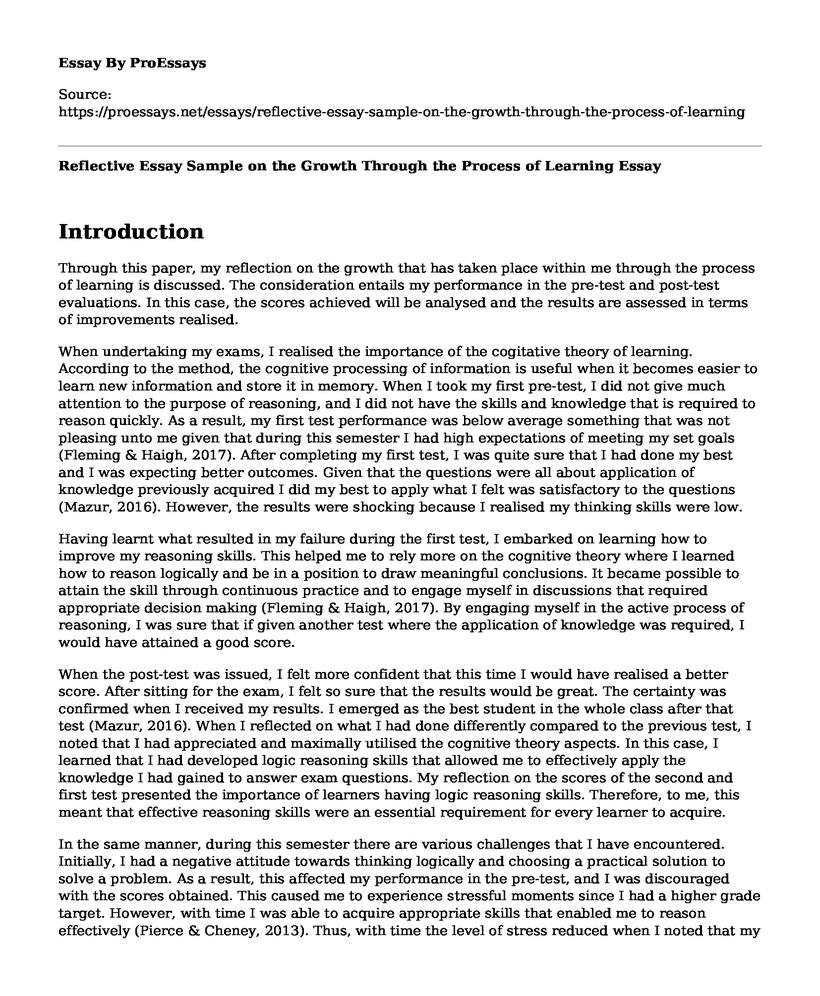Introduction
Through this paper, my reflection on the growth that has taken place within me through the process of learning is discussed. The consideration entails my performance in the pre-test and post-test evaluations. In this case, the scores achieved will be analysed and the results are assessed in terms of improvements realised.
When undertaking my exams, I realised the importance of the cogitative theory of learning. According to the method, the cognitive processing of information is useful when it becomes easier to learn new information and store it in memory. When I took my first pre-test, I did not give much attention to the purpose of reasoning, and I did not have the skills and knowledge that is required to reason quickly. As a result, my first test performance was below average something that was not pleasing unto me given that during this semester I had high expectations of meeting my set goals (Fleming & Haigh, 2017). After completing my first test, I was quite sure that I had done my best and I was expecting better outcomes. Given that the questions were all about application of knowledge previously acquired I did my best to apply what I felt was satisfactory to the questions (Mazur, 2016). However, the results were shocking because I realised my thinking skills were low.
Having learnt what resulted in my failure during the first test, I embarked on learning how to improve my reasoning skills. This helped me to rely more on the cognitive theory where I learned how to reason logically and be in a position to draw meaningful conclusions. It became possible to attain the skill through continuous practice and to engage myself in discussions that required appropriate decision making (Fleming & Haigh, 2017). By engaging myself in the active process of reasoning, I was sure that if given another test where the application of knowledge was required, I would have attained a good score.
When the post-test was issued, I felt more confident that this time I would have realised a better score. After sitting for the exam, I felt so sure that the results would be great. The certainty was confirmed when I received my results. I emerged as the best student in the whole class after that test (Mazur, 2016). When I reflected on what I had done differently compared to the previous test, I noted that I had appreciated and maximally utilised the cognitive theory aspects. In this case, I learned that I had developed logic reasoning skills that allowed me to effectively apply the knowledge I had gained to answer exam questions. My reflection on the scores of the second and first test presented the importance of learners having logic reasoning skills. Therefore, to me, this meant that effective reasoning skills were an essential requirement for every learner to acquire.
In the same manner, during this semester there are various challenges that I have encountered. Initially, I had a negative attitude towards thinking logically and choosing a practical solution to solve a problem. As a result, this affected my performance in the pre-test, and I was discouraged with the scores obtained. This caused me to experience stressful moments since I had a higher grade target. However, with time I was able to acquire appropriate skills that enabled me to reason effectively (Pierce & Cheney, 2013). Thus, with time the level of stress reduced when I noted that my powers of reasoning had improved and I was able to make appropriate decisions.
Most importantly, after learning the skills incorporated in cognitive theory, my personal life changed. It became more comfortable for me to engage in active discussions and come up with effective decisions that were supported by my team members. In most cases, it becomes possible for our team to make important decisions. At some point, I have been invited to a committee where the decision-making process is taking place, and fruitful results have been realised (Pierce & Cheney, 2013). Similarly, I have helped to solve conflicts among my fellow colleges by helping them to come up with appropriate ideas which help them to resolve their differences.
Arguably, it has come to my realisation that in future I will realise more benefits from the attained cognitive skills. Not only will the skills help enhance good performance in other subjects, but they will help me to shape my future appropriately since I will be in a position to assess what is the best decision and make my choices effectively. Nevertheless, during my school time, I will be able to make more friends due to how I will be useful in helping them to make the right choices and come up with the most appropriate strategies to solve their situations. Overall, I am hopeful that I will make it in my education and pursue my studies to attain even more useful skills that will make me a great person in future.
References
Fleming, J., & Haigh, N. J. (2017). Examining and challenging the intentions of work-integrated learning. Higher Education, Skills and Work-Based Learning, 7(2), 198-210.
Mazur, J. E. (2016). Learning & behavior. Routledge.
Pierce, W. D., & Cheney, C. D. (2013). Behavior analysis and learning. Psychology Press.
Cite this page
Reflective Essay Sample on the Growth Through the Process of Learning. (2022, Nov 30). Retrieved from https://proessays.net/essays/reflective-essay-sample-on-the-growth-through-the-process-of-learning
If you are the original author of this essay and no longer wish to have it published on the ProEssays website, please click below to request its removal:
- Child Development: Importance of Reading to Children at an Early Age Essay
- Essay on Improving Writing Power: Language Power Tutorials for Students
- Paper Example on Maximising Learner Potential: Inclusive & Equitable Teaching
- Essay Sample on Parental Involvement in Education: Bridging the Gap Between Parents and Schools
- Essay Example on Smartphones: Benefits and Risks for Students
- Lawrence Kinlin School of Business: Health & Safety Critical Aspect - Essay Sample
- Essay on Maximizing Student Engagement: The Importance of Classroom Support







